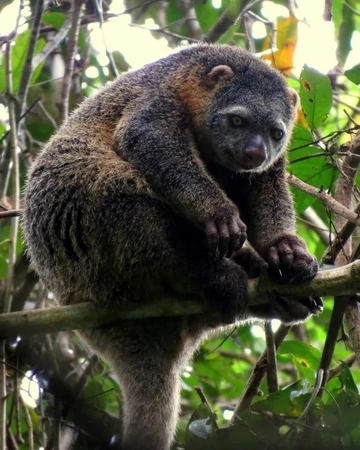Bear Cuscus Ailurops ursinus
Vulnerable
Location: West Papua (Indonesia)
The Bear Cuscus is listed as Vulnerable because of an ongoing population decline estimated and projected to exceed 30% over three generations (~16 years, half of that period in the past and half in the future), due to the high rate of deforestation and hunting of this species on Sulawesi. This species occurs on the island of Sulawesi, Indonesia, and the adjacent Indonesian islands of Butung, the Peleng Islands, the Togian Islands, and possibly Muna (Flannery 1995). The Bear Cuscus ranges from sea level to over 600 m asl. They are typically found in undisturbed tropical lowland moist forests. This species does not readily use disturbed habitats, thus they are not usually found in gardens or plantations (M. Kinnaird pers. comm.). The Bear Cuscus is a largely diurnal, arboreal species that is often found in pairs. Main threats include habitat loss due to clearance of forest for small-scale agriculture and through large-scale logging, they are also heavily hunted by local people for food, and collected for the pet trade.
Bear Cuscus’ are found on #Sulawesi #Indonesia they are vulnerable due to #palmoil #deforestation and #hunting. Support this beautiful animal with your weekly shop #Boycottpalmoil #Boycott4Wildlife
Tweet
Further Information




Salas, L., Dickman, C., Helgen, K. & Flannery, T. 2019. Ailurops ursinus. The IUCN Red List of Threatened Species 2019: e.T40637A21949654. https://dx.doi.org/10.2305/IUCN.UK.2019-1.RLTS.T40637A21949654.en. Downloaded on 26 January 2021.

How can I help the #Boycott4Wildlife?
Contribute in five ways
1. Join the #Boycott4Wildlife on social media and subscribe to stay in the loop: Share posts from this website to your own network on Twitter, Mastadon, Instagram, Facebook and Youtube using the hashtags #Boycottpalmoil #Boycott4Wildlife.
2. Contribute stories: Academics, conservationists, scientists, indigenous rights advocates and animal rights advocates working to expose the corruption of the palm oil industry or to save animals can contribute stories to the website.
3. Supermarket sleuthing: Next time you’re in the supermarket, take photos of products containing palm oil. Share these to social media along with the hashtags to call out the greenwashing and ecocide of the brands who use palm oil. You can also take photos of palm oil free products and congratulate brands when they go palm oil free.
4. Take to the streets: Get in touch with Palm Oil Detectives to find out more.
5. Donate: Make a one-off or monthly donation to Palm Oil Detectives as a way of saying thank you and to help pay for ongoing running costs of the website and social media campaigns. Donate here








